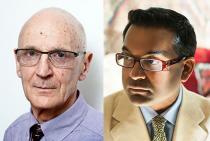One of the biggest obstacles to reducing the rate of unplanned pregnancies is the lack of sex education in schools. If more teenagers had access to sex education and contraception, fewer girls would have their lives interrupted by pregnancy. Only by empowering women and girls with the resources to control their reproduction will the grim statistics that have long burdened Guyana – and many other countries – begin to change for the better. By Patricee Douglas
You are here
Results for Op-Ed Global Health
Friday 18 January 2019
Georgetown, Guyana
Monday 14 January 2019
New York, USA
In a world divided by conflict and greed, the Global Fund’s fight against AIDS, tuberculosis, and malaria is a matter of enlightened self-interest and a reminder of how much humanity can accomplish when we cooperate to save lives. For public and private donors, that means providing the financing needed to eliminate all three scourges by 2030.
Thursday 6 December 2018
Geneva, Switzerland
Each year, some 700,000 people die from drug-resistant infections worldwide. But superbugs also pose a threat to the effectiveness of modern medicine; if left unaddressed, antimicrobial resistance (AMR) could make more infections untreatable, cancer therapies ineffective, routine surgeries impossible, and even childbirth unsafe. By Seth Berkley and Jeremy Farrar
Friday 19 October 2018
Geneva, Switzerland
Unfortunately, few agricultural workers are in a position to advocate for their rights. Seasonal and rural workers lack access to collective bargaining, and undocumented migrant workers avoid unions for fear that employers will retaliate by calling the immigration authorities. Moreover, basic benefits such as social security, health care, and workers’ compensation are typically nonexistent. By Hilal Elver and Melissa Shapiro
Tuesday 25 September 2018
3 comments
San Francisco, USA
The addictive qualities of sugar are embedded in its economics. Not everyone who is exposed to sugar becomes addicted; but, as with alcohol, many do. In fact, sugar’s allure is a big reason why the processed food industry’s current profit margin is 5% (up from 1%), and why so many of us are sick, fat, stupid, broke, depressed, and just plain miserable. Robert H. Lustig.
Monday 24 September 2018
Geneva, Switzerland
At the United Nations General Assembly in New York, global heads of state are meeting on September 26-27 to highlight two major health threats. On the first day, they will discuss strategies to end tuberculosis (TB), an ancient bacterium that remains the world’s deadliest infectious disease. On the second day, world leaders will discuss plans to beat leading NCDs such as cancer, diabetes, and cardiovascular and lung disease. Combined, NCDs are responsible for seven out of every ten deaths globally. By Tedros Adhanom Ghebreyesus
Wednesday 25 July 2018
Brighton, United Kingdom
For now, I share the excitement of many that a new tool to tackle HIV may be on the horizon. This prospect will be a topic of much discussion when prevention strategists gather in Amsterdam this week for the 22nd International AIDS Conference. But, no matter what becomes of this latest vaccine-related discovery, the world will still have a long way to go before HIV is eradicated. To increase our chances of success, prevention programming must remain at the top of the agenda.
Thursday 7 June 2018
Hamilton, Canada
In many parts of the world, there are simply no more conventional freshwater resources available to meet growing demand. Beyond limiting economic development, the lack of sufficient freshwater resources threatens the wellbeing of billions of people by causing conflict, social unrest, and migration. The only way to address this challenge is by radically rethinking water-resource planning and management in a way that emphasizes the creative exploitation of unconventional water sources. By Manzoor Qadir and Vladimir Smakhtin
Monday 14 May 2018
New York, USA
For decades, the global health community has paid lip service to the critical role of unequal power relations, particularly relating to gender, in determining health outcomes. A recent report by the advocacy and accountability group Global Health 50/50 which reviewed 140 organizations working in the global health sector, makes for disturbing reading....The situation is even worse for men and boys, who, regardless of country, can expect to live shorter, unhealthier lives than their female peers. According to the report, only a third of organizations take a gendered approach to the health needs of the whole population, and no organizations target men and boys specifically. By Helen Clark and Sania Nishtar
Wednesday 25 April 2018
Basel, Switzerland
Ending an epidemic is a marathon undertaking, and in the case of malaria, we are nearing the finish line. But we will need to keep up the momentum. Still, mounting challenges such as drug and insecticide resistance threaten to reverse the progress we have made. For two consecutive years now, malaria deaths have risen, while funding has flatlined. This year’s World Malaria Day (April 25) should thus spur a redoubling of our efforts. Eradicating malaria will require new medical and health-policy solutions as well as stronger political will.
Wednesday 28 February 2018
Massachusetts, United States
The speculation spreads every time an older politician of either party blunders verbally or seems to lose the thread: Is it Alzheimer's? Early dementia? Impaired judgment? At a recent Harvard Law School Petrie-Flom Center forum called "Dementia and Democracy" Professor Francis Shen of the Center for Law, Brain and Behavior made a point: Politicians, who have huge advantages as incumbents, and federal judges, who serve for life, tend to stay on the job well past typical retirement ages. But their cognitive failings can often be very difficult to pin down. So what is to be done? By Carey Goldberg.
Thursday 8 February 2018
Brasilia, Brazil
With obesity and diet-related diseases on the rise, and hunger and malnutrition affecting more people than ever before, scientists are focusing not only on how to feed the planet, but on what to feed it. Today, bad diets seem to have more staying power. Natural and raw foods are being replaced by ready-to-eat meals and processed foods. This trend has created an unhealthy globalized menu, one associated with obesity, diabetes, hypertension, and shortened lives. By Eduardo Nilson.
Wednesday 10 January 2018
London, United Kingdom
Since Donald Trump took over the United States presidency a year ago, doubts over his mental stability and his very sanity have been mounting. But, beyond claiming on Twitter that he is a “very stable genius,” what could Trump actually do to prove that he is psychologically fit for what, by some definitions, is the world’s highest office? There is no clear physical test for mental illness. By Raj Persaud and Peter Bruggen
Wednesday 20 December 2017
Geneva, Switzerland
We all know how bad tobacco is, that it kills millions of people every year, and that it harms many more. We also know that tobacco companies have consistently lied about how much damage their products cause. The WHO Protocol to Eliminate the Illicit Trade in Tobacco Products aims to prevent illicit trade, such as smuggling. While 33 countries and the European Union have signed the protocol, it needs the support of seven more governments before it can enter into force.
Thursday 30 November 2017
Geneva, Switzerland
On this year’s World AIDS Day, on December 1, we should remember the 35 million people who have died of AIDS-related illnesses, and the 76 million who have been infected with HIV since reporting began. And we can celebrate the fact that nearly 21 million people living with HIV now have access to life-saving treatment. But we also must not lose sight of the fact that more than 15.8 million people are still awaiting treatment, while an estimated 11 million people do not even know they have the virus.
Friday 6 October 2017
Reykjavik, Iceland
Just as some of us live longer than others, countries have different average life expectancies. At the bottom of the scale is Swaziland, the only country in the world where a newborn still cannot expect to reach age 50. And at the top is Hong Kong, where a newborn can expect to live to age 84...But life expectancy can also vary significantly within countries, between rich and poor...Moreover, this gap widened over time.
Wednesday 19 July 2017
Liverpool, United Kingdom
Science fiction has long explored the terrifying possibility that we are devoid of free will, and that some unpleasant creature could control our minds or turn us into plodding zombies. But mind control is not just a literary trope. It is also a common method by which parasites gain access to environments where they can grow, reproduce, and complete their life cycles. By Robbie Rae.
Saturday 15 July 2017
Oxford, United Kingdom
In recent years, the world has become increasingly preoccupied with the catastrophic potential of global warming and other human-induced environmental changes, and rightly so. But one of the most serious risks has been all but ignored: the threat to human health. ...Determined opponents will question the science and criticize those who claim that human health is being jeopardized by environmental disregard. But to these critics I pose a question of my own: “Are you willing to risk being wrong?" By Shaukat Aziz.
Thursday 11 May 2017
New York, USA
Each year, more than 1.25 million people – many of them young people – die in automobile accidents. And whether or not a car is exceeding posted speed limits often is the difference between life and death. The fourth annual United Nations Global Road Safety Week, May 8-14, provides a chance to draw more attention to Improving road safety..
Saturday 29 April 2017
Singapore
Vitamin D helps our bodies regulate levels of calcium and phosphate – nutrients that keep bones, teeth, and muscles healthy. Often, sunlight on our skin can be enough to enable us to produce all the vitamin D we need. But when sunshine is lacking, vitamin D must be ingested, and it can be difficult to meet the recommended levels from food alone. This matters because the health benefits of adequate vitamin D intake may be even greater than previously thought. Even obesity may have connections to vitamin D- which aids weight loss.























